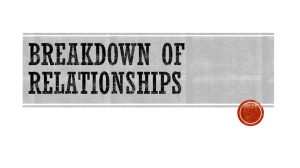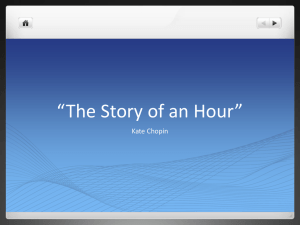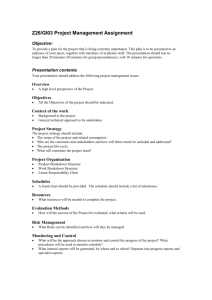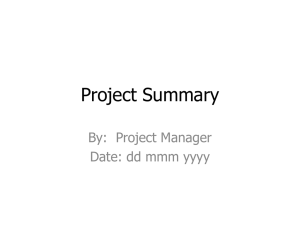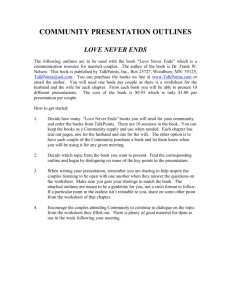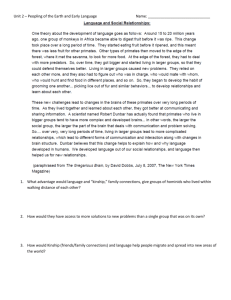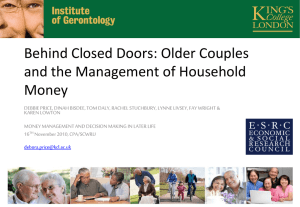HUBERT KAIRUKI MEMORIAL UNIVERSITY
advertisement
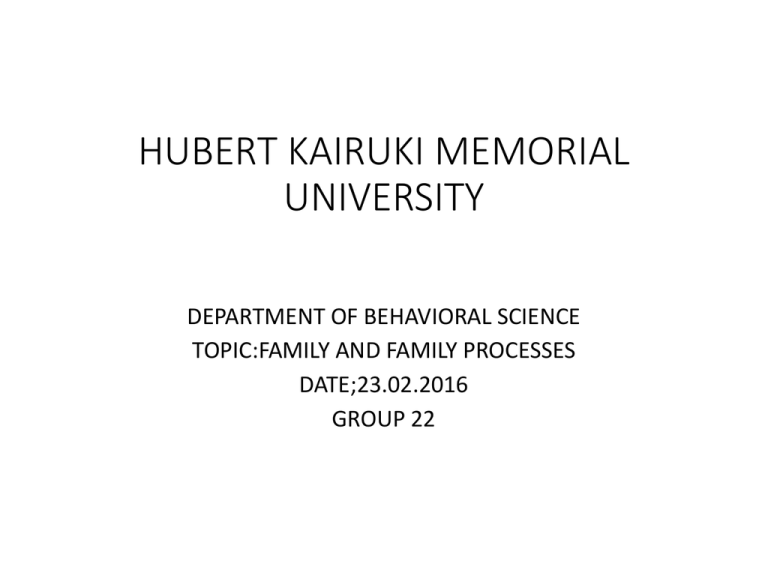
HUBERT KAIRUKI MEMORIAL UNIVERSITY DEPARTMENT OF BEHAVIORAL SCIENCE TOPIC:FAMILY AND FAMILY PROCESSES DATE;23.02.2016 GROUP 22 FACILITATOR; MR ISAAC LEMA • • • • • • • • • • • • PRESENTERS .1.GODFREY CHAULA 2.GITOMELDA ASKWERY 3.NKWABI MEJA 4.GEORGE ABEL 5.GLADNESS SHAYO 6HAMDAN JUMA 7HERMAN NGOWI 8IBRAHIM SADICK 9.ISAACK EDWARD 10.JUDITH FIDELIS 11.FRANK MBAMBA TABLE OF CONTENTS • • • • • • • • INTRODUCTION OBJECTIVES DEFINITION OF TERMS MAIN DISCUSSION RECOMENDATIONS SUMMARY CONCLUSION REFFERENCES OBJECTIVES • At the end of this topic you should be able to understand; • (1). Family and family processes • (2). Types of families • (3).theories of family • (4).Role relations within the family • (5) Changes in family structure • (6)Breakdown in family ties FAMILY • Is a group of people related by blood , marriage or strong common bond such as those from common ancestors or a husband and wife • A family as an institution has got its distinctive features like : • 1. Family last for a considerable long period of time than any other social group • 2. Family is intergenerational ( large age difference) • 3. Family contains both biological and affinal relationship between members FAMILY PROCESSES • Is the psychological , physiological and spiritual function on relationship within the family unity • The family processes involves theory , practices and philosophical understanding of qualituve and quantitive clinical research and training of couples to aid family therapy , interactions and relationship with networks and large systems • It involves the use of social media to colect information about the present and upcoming issue of families TYPES OF FAMILIES • Families has got diffferent types depend on the nature and membership relations such as follows • (a)Blended family: • Is a family composed of married couples and their offsprings including some from previous marriage • (b) Dysfunctional family: • Is the family in which the adult care givers are unable to consistently fulfill their famil responsibilies • (c).Extended family • Is a nuclear family and their close relatives such as their,children's grand parents ,aunts and uncles TYPES OF FAMIL..... • (d) Nuclear family • Is the family consisting of a husband and wife with no children • (e)Single parent family • Is the family in which a lone parent live together with children • (f) Skewed family • Is the family in which one spouse is severly dsfunctional and the other spouse assure an acquiescent peace making,stands to maintain equilibrium THEORIES OF FAMILY • (A) Exchange framework • Individuals rationally weigh the rewards and costs associated with behavior choices (self interest) • (B)Symbolic interaction framework • To understand the social behaviors , the must understand the message actors assign to the situation and actors idealism. • (C) Family development framework • Focuses on the systematic and patterned changes experienced by families as they moved through stages of their family life course ROLE RELATIONS WITHIN THE FAMILY • Motherhood , fatherhood and childhood are all social roles. Although influenced by the constraints of biology ,they are essentially culturally organized,and so strongly influence d by the wider rules of family membership for example in extended family ,since a woman joins the whole if her husbands family she may have to put as much effort into establishing good relations with her mother-in-law as with her husband • Even within one general cultural system ,role expectations can both change and vary enormously ROLE RELATIONS....... • ....forexample in ,in Britain many husband now play a Mich larger part in running a households and in child care than was generally the case two generation ago this change has been partly precipitated by the fact that a much large of women now go out work. CHANGES IN FAMILY STRUCTURE • Fmily is a static institution. They change over time as parents age,children grow up, and as cultural norms alter. The precise way in this processes work out depends upon the particular cultural context .In patrilineal extended family sons grow up and begin to challenge their fathers power, though do not neccesserily consider leaving home.In British families children usually establish independent household of their as soon as they achieve a stable conjugal partnership. CHANGES IN FAMILY....... • ......most couples in contemporaly britain can now to spend a longer period of time together on their own than they did during the years if child bearing .This avoids some potential conflicts between the generations ,but leaves older people feeling lonely and isolated . BREAKDOWN IN FAMILY TIES • It is worth remembering that the impending demise of family life has been confidently predicted ever since the beginning of recorded history, and yet the institution is very much with us • Virtually everywhere in the industrialized world the strength of kinship network between extended families has been greatly attenuated in recent years even so this attenuation is not universal BREAKDOWN...... • ...tiea between and daughter ,even though they live in different households , are most noticeably resilient • Doctors should not only check the assumption s about the family I terms of which each of their patients is operating, but also what resources are actually available to them. The community does provide support if local networks do not exist nor if they have been eroded to insignificance . RECOMENDATIONS • As in other small groups conflicts and tensions is invariably found as well as cooperation and understanding, and indeed without it family life would exceedingly dull, therefore members of family should struggle towards a renegotiation of relationship and a new equilibrium .they may need assistance in doing so ,but if this is not available,or if disagreement is so strong as to be insoluble,complete breakdown may occur SUMMARY • Fmily is a strong social institution tha is composed of blood related members or by strong bond like marriege ,,The family processes involves the investigation of the problems arising in family so as to strengthen the institution to bring unit so as to ensure effective role playing among members. CONCLUSION • Despite all the problems they may face ,families are likely to sustain themselves as resilient instituitions because if the vital functions they fulfill.It is into families that we are born,its here that we are socialized,and establish our closest ,most enduring and most pationate relationship.Important as our other activities may seem,it is in the domestic context that we spend the greater part of our time,that we eat and sleep and take our lessure. Above all isrefuge in times of stress.It is ties of family and kinship,however they may be structured... CONCL... • ...which invariably provides the soundest and most satisfying foundations for mutual support. • It is for this reason that doctors need to develope the capacity to understand,and to work positively with their patients in their domestic context ,whatever shape ir form their families may have. REFFERENCES • Rapaport RH Forgarty M.P and Papaport R (Eds)1982 Families in britain London, Routledge and Kegan Paul • Family theories by David M.Kellen and James M.WhiteWhiteWhiteWhite. • Lecture notes on behavoiral science by A.C.PSims and W.I.Humes.

